How to Avoid Burnout and Overtraining for Swimmers
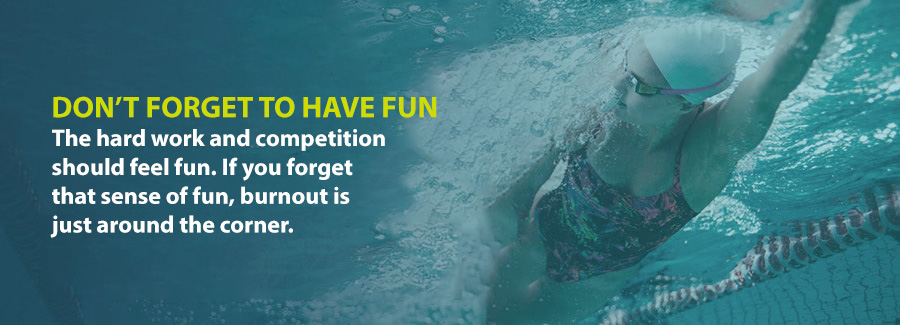
Swim Tips
|
October 24, 2022
How to Avoid Burnout and Overtraining for Swimmers
Competitive swimming takes long hours and personal commitment. Early mornings in the pool, tailoring your meals to keep your body in the best possible shape and mentally rehearsing every stroke all leads up race day. Race day should be exciting, the culmination of all of your hard work. But all competitive athletes, swimmers included, are at risk of overtraining and burning out during those long hours of practice. Burnout in competitive swimmers can lead to poor performance and ultimately the abandonment of the sport. Losing the passion for swimming can be extremely disappointing, but luckily, burnout is not inevitable. Learn how to avoid burnout in swimmers with these helpful tips.What Is Burnout and Overtraining in Swimming?
Overtraining in competitive swimmers can start at a young age. Children often crave variety. A study of college athletes found that 98 percent of the study group played a different organized sport before college. On average, the college athletes did not start focusing on a single sport until age 15. The study results suggest kids should be allowed to explore other organized sports. They can learn a variety of skills and have fun along the way. If and when they decide swimming is the sport for them, they will have learned a lot about what they are capable of and what it takes to commit to a sport. It is easier to avoid burnout when the athlete knows how hard they will have to work and what will come of all of that hard work. Older athletes may have the benefit of years of experience and focus, but they are still susceptible to overtraining and burnout. Overtraining means pushing your body too hard. It can lead to physical injuries and contribute burnout. Burnout is a cumulative experience born from more than just long hours. Burnout in competitive swimmers happens when they do not feel their goals are attainable, when they lack support and when they are unable to take a break, both physically and mentally.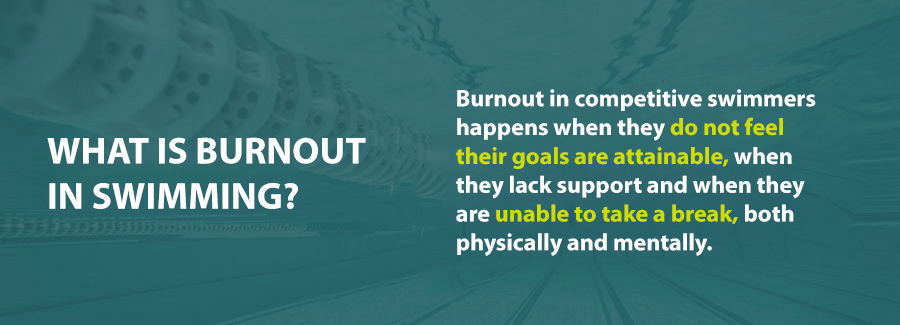
Signs of Burnout and Overtraining
If you want to know how to avoid overtraining in swimmers and eventual burnout, you need to know how to recognize the signs that indicate a problem1. Lack of Enthusiasm
A sudden drop off in enthusiasm for swimming can indicate both overtraining and burnout. If a swimmer no longer feels the drive to pursue goals actively or no longer feels like the pursuit of those goals is worthwhile, they are likely being pushed too hard. Competitive swimming takes a great deal of motivation and dedication, and waning enthusiasm shows that a swimmer is struggling to find that motivation and dedication. This could be a symptom of overtraining, the long hours taking the joy out of the sport. It could also be symptomatic of a deeper burnout. Check how you feel when you get in the pool. Are you ready to throw yourself into practice? Are you excited about that upcoming race? Or, do you dread practice even before it starts? Does each race feel like a chore?2. Health Issues
Competitive swimmers demand a lot of their bodies. All of those long hours of training will make you physically fit, but there is such a thing as too much. Your body will warn you if you are pushing too hard and overtraining. You might find you are getting sick more often. Your joints and muscles might ache for longer after your training sessions. You might even notice you have lost weight. The stress your body is enduring will make it more prone to injuries. These are all signs of overtraining. If you continue to train at that level, it will take a toll on your physical and mental health. The physical effects of overtraining can increase your stress levels and make you unhappy. Prolonged overtraining is a strong indicator that a competitive swimmer is headed toward burning out.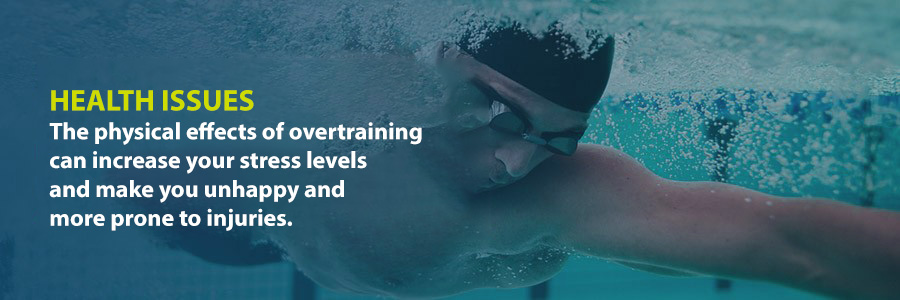
3. Noticeable Changes in Performance
If you are feeling the physical and mental effects of overtraining and burnout, that is bound to be reflected in your performance in the pool. Your times might become steadily worse as your motivation drains and your body suffers the physical consequences of training too much. Or your times might be erratic. Maybe you feel you should push yourself to achieve improved times, but you can only manage the strength and dedication to do it on occasion. If the issue is solely overtraining, you are probably going to be frustrated by your poor performance. If you are burnt out, you will likely care little for the poor outcomes, whether at practice or a meet. It is even possible that a once cooperative swimmer will begin to butt heads with teammates and coaches. A decline in performance and change in attitude are both signs that a swimmer is training too much or already burnt out.4. Exhaustion
Feeling tired after a long day of training or a competitive meet is normal. Feeling exhausted all of the time is a sign that something is wrong. Your body needs a chance to rest. If it does not get that, burnout is almost inevitable. This can lead to a vicious cycle. A swimmer can be so tired that they dread getting into the pool. Anxiety can disrupt healthy sleep patterns and make the swimmer even more exhausted. Listen to your body. Are you simply tired from a rigorous workout? Will you feel rested and ready to train again after a good night's rest? Or are you finding yourself exhausted all of the time? Checking your heart rate is a good way to measure how well your body is adapting to the physical work you are asking of it. If your resting heart rate is elevated by 10 to 15 beats per minute for two or three days in a row, your body might be struggling to meet the demands of your training.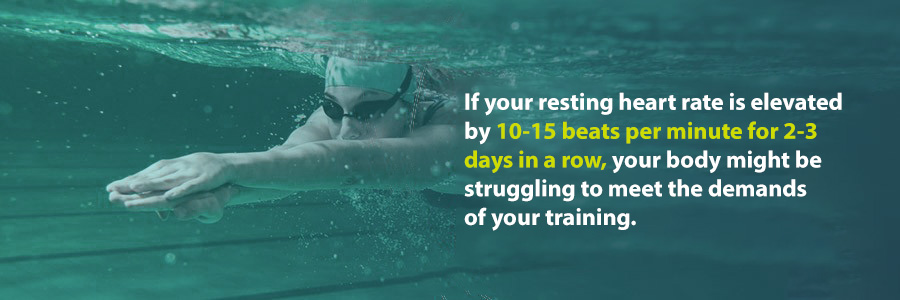
5. Struggles Outside of the Pool
The issues caused by burnout and overtraining will not end when a swimmer gets out of the pool. The physical exhaustion and greater tendency for illness and injury will affect day-to-day life, as will the mental stress. Burnt out swimmers might start to suffer poor performance in other areas of their lives, like school or work. They might exhibit different behaviors and attitudes brought on by prolonged physical and mental stress. If you notice a pattern of issues outside of the pool, ask yourself if you are pushing yourself too hard or if you are heading toward becoming burnt out. Shop Swim GearTips for Avoiding Burnout and Overtraining
Once you recognize you are on the road to overtraining and burnout, take the time to stop. See if you can discover the root of the problem. Here are a few tips to address those potential problems and get back on the right track.1. Maintain Variety
It is easy to become burnt out in any sport or activity if you become bored or feel trapped in a never-ending cycle of repetition. You might be pushing yourself to do the same exercises over and over again, putting yourself at risk of overtraining and eventual burnout. Instead of focusing on a narrow range of exercises, introduce variety into your swimming routine. Try practicing at a different pool, if possible. Change the schedule for your training. Ask your coach and teammates for suggestions on different exercises. Try different types of on-land exercises. Find ways to challenge yourself every day without pushing your body and mind too far. If you feel like you are still stuck in a routine that is pushing you toward burnout, be honest with yourself and ease up on the pressure. Ask advice from the people you trust, so you can find a way back to a place where you can enjoy swimming. You can still keep up with your training and accomplish your goals without swimming becoming an activity you dread.2. Set Attainable Goals
Having undefined or unreachable goals is one of the biggest factors leading to burnout in swimming and any other area of life. First, if your goals are unrealistic — for example, beating a world record at your very first swim meet — it is easy to feel like your hard work is worth nothing. You spent all of those hours training, but you still did not beat that world record. Why even bother trying? Without a sense of accomplishment, swimming can quickly become a chore. It is also likely you will push yourself into overtraining in pursuit of your lofty goals, further contributing to burnout. This does not mean you should swim without clear goals in mind. On this opposite end of the spectrum, you will likely feel aimless. If you are not working toward something, why are you trying so hard? To avoid this potential pitfall, set attainable goals for yourself. Work toward polishing your reaction time off of the blocks and your kick turns. Work toward beating your personal best time, if even by a split second. Work toward placing in a swim meet. Be honest with yourself when setting goals. Ask for advice. When you have your concrete goals, keep them in front of you as you train and compete. When you achieve a goal, take the time to celebrate and make a new goal. Even small successes go a long way toward avoiding burnout.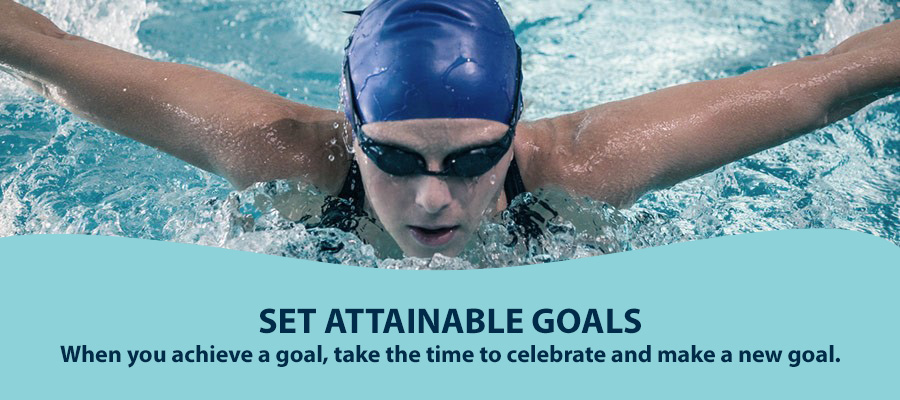
3. Allow Sufficient Recovery Time
Swimmers know a lot about endurance. You are up and in the pool before a lot of people have even hit snooze on their alarms for the first time. You train long hours and push your bodies to perform at their peak during races. This endurance is something to be proud of, but you have to remember that the body always has its limits. If you do not allow your body sufficient time to recoup from an injury, illness or even simple exhaustion, you are at the point of overtraining. Overtraining is unsustainable over long periods of time. You will likely burnout out, and your body will certainly pay the price. Pushing through when your body needs that recovery time will not make you a better athlete. It will ultimately cause a series of setbacks that will take you further from your goals, compounding the other burnout risk factors. Even high-level swimmers need to allow time for their bodies to recover. In addition to physical recovery, competitive swimming can be high-stress for many athletes. Stress heightens as competitions draw closer. Recognize the signs of physical and mental stress. Between competitions, give yourself some breathing room. Lighten your training schedule. Take a day off. Allowing that recovery time will better prepare you for future challenges and leave you feeling refreshed, rather than stretched too much and on the verge of burnout.4. Balance Responsibilities
Competitive swimming demands a lot from your schedule, but it is important to remember it is not the only responsibility you have. If any single activity subsumes everything else in your life, you will probably grow to resent it. Everyone, younger and older athletes, needs to find the right balance in their lives. Make sure your swimming schedule does not negatively affect your work and school responsibilities. If it does, you need to reassess your time management. Competitive swimmers also need time to socialize and relax. Go out with your teammates for an evening. Spend time with your other friends and family outside of the pool. Take time to be by yourself. Sometimes this can seem like an impossible juggling task, but taking the time to figure out what works for you is worth it. Allowing swimming to take up all of your time will increase the probability of overtraining and eventual burnout.5. Don't Forget to Have Fun
Not everything about any sport is fun. There are long hours. There are blood, sweat and tears involved – sometimes figuratively, sometimes not. When you swim competitively, your hair is always on the verge of being dried out by chlorine. You are tired from those early morning laps. Sometimes you are sore. Sometimes you would rather be anywhere but in the pool. But in the end, these should be fleeting concerns. You should look forward to the next meet. You should feel a surge of adrenaline when you step up onto the blocks. The hard work and competition should feel fun. If you forget that sense of fun, burnout is just around the corner. Pushing yourself so hard for something that you do not even enjoy is not worth it. If you feel that sense of fun slipping away, ask yourself why. Are you overtraining and not letting your body recover? Are you chasing goals you will never meet? Are the other responsibilities in your life suffering? Try to ease the root cause of the pressure. This can be difficult when competition is involved. After all, winning takes serious dedication. Think of fun as one of your goals, alongside improving your time and technique. It's okay to laugh in the pool, and it's okay to try some new, silly exercise. If you keep seeing swimming as fun, why would you ever want to stop?




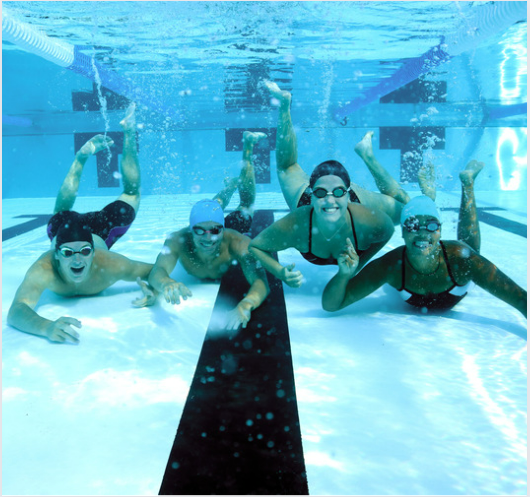
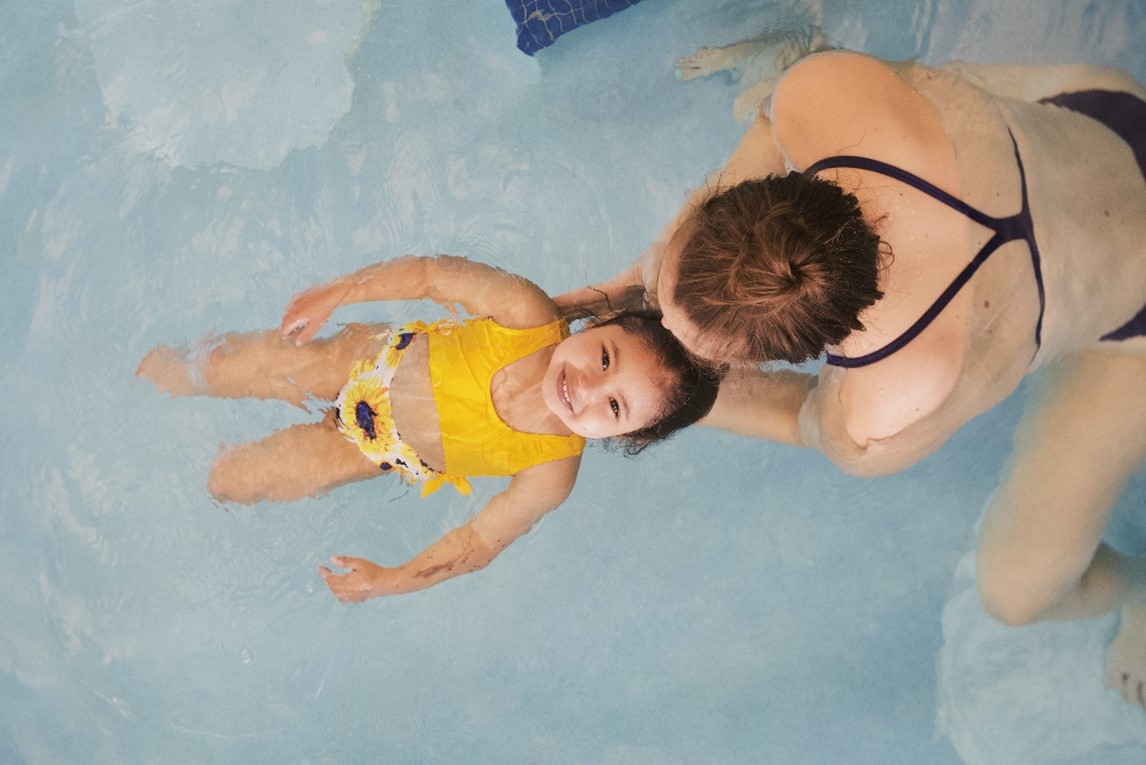

Leave a Comment
Your email address will not be published. Required fields are marked *